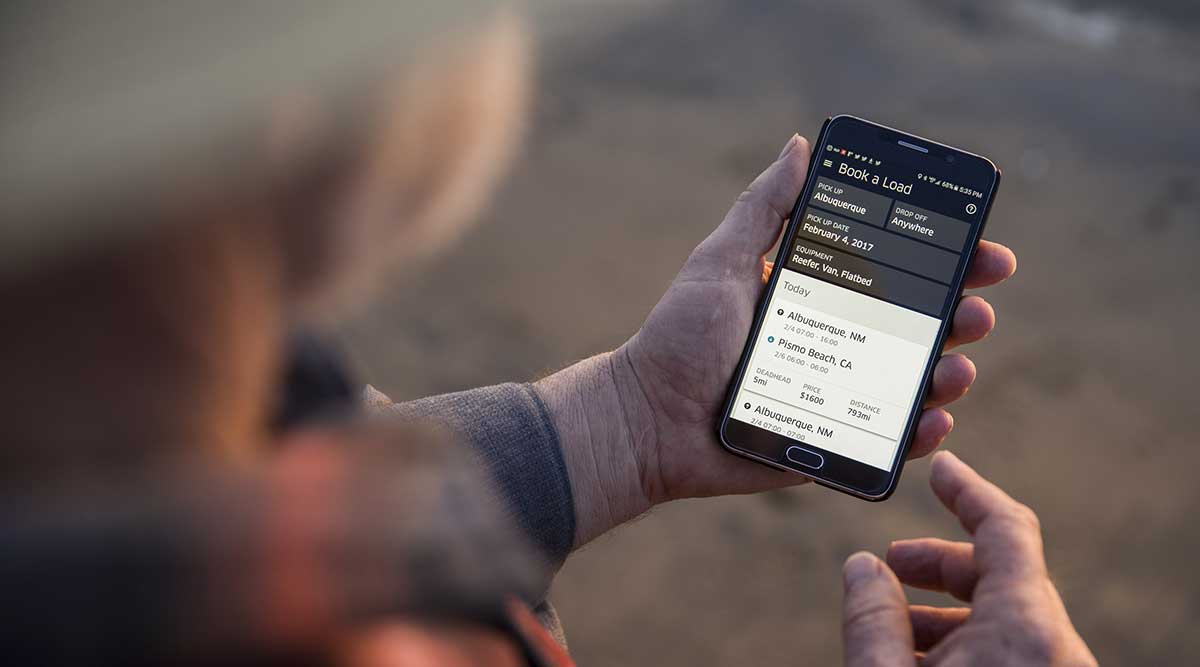Managing Editor, Features and Multimedia
Uber Launches App-Based Freight Platform

After surging to prominence with its ride-hailing app for car passengers, Uber Technologies Inc. is targeting trucking as its next big venture.
The company on May 18 launched Uber Freight, a mobile app designed to streamline freight booking, particularly for small carriers and shippers that still rely heavily on manual processes.
“Uber Freight is the Uber for trucking. It provides one-touch booking for drivers, which is new to the industry,” Uber Freight Director Bill Driegert told Transport Topics.
The goal, Driegert said, is to “make the lives of truck drivers better” by making it easier to find good freight, simplifying transactions and providing upfront pricing and quick payment for their work.
“In building Uber Freight, we’re really trying to bring a community of drivers together around a product that pays fairly, pays quickly and can bring some of that transparency and trust back into the industry,” said Eric Berdinis, Uber Freight’s senior product manager.
With the launch of its freight product, Uber joins several other technology firms that have introduced app-based freight platforms. That trend often has been described as the “Uberization of trucking” — a movement that now, of course, includes Uber itself.
RELATED: Three Wharton dealmakers bet their future on trillion-dollar Chinese trucking industry
Other companies providing smartphone-enabled, automated freight markets include Transfix, Convoy and Trucker Path’s Truckloads app.
While Uber Freight will work with carriers of all sizes, its primary market is owner-operators and small fleets that don’t have the same technology as larger operations.
“Our app right now is targeted toward the smaller companies — the companies that don’t have access to large shippers and have a harder time finding the freight,” Berdinis said.
Prior to the launch of Uber Freight, Uber first entered the trucking industry in August through its $680 million acquisition of Otto, which is developing autonomous driving technology for heavy-duty trucks.
“Uber has multiple bets in shaping the future of trucking. Uber Freight is one of them, self-driving trucks with the Otto acquisition is another,” Berdinis said. “At some point there might be a connection between the two, but for now it’s two separate teams, two separate businesses and two equally lofty goals to move the industry forward.”
So much great stuff going on! #uberfreight pic.twitter.com/OIz1ED6AGl — travis kalanick (@travisk) May 8, 2017
Uber Freight currently handles dry van and refrigerated truckload freight, shorthaul and longhaul.
The service is available nationwide, Berdinis said, but the company has focused much of its early efforts on signing up drivers and shippers in Texas to create a launch market in an area with dense freight movements.
RELATED: Uber ordered to return stolen Waymo files
Uber would not say how many trucks are active on the platform or how many shippers are using it at launch.
The company has been building Uber Freight and working with carriers and shippers to refine the app since late last year, said Driegert, who helped lead other transportation industry disruptors before joining Uber last year.
Driegert was chief innovation officer at Coyote Logistics prior to that company’s acquisition by UPS Inc. in 2015 for $1.8 billion. He later worked as director of planning and innovation at Amazon.com for two years.
Uber has a freight broker license and vets carriers in much the same manner as a traditional broker.
That vetting process aims to ensure that all carriers have the right safety and inspection history and the right equipment for Uber’s freight network.
New carriers initiate that process by signing up at freight.uber.com.
The app is free to download from the App Store and Google Play.
Uber Freight is a tool for drivers to find and book loads, but it is not a dispatching service. Carriers open the app, see the prices and select the loads they want.
Uber also is focused on paying drivers as quickly as possible, Berdinis said. “We’re even trying to push the boundaries and get them paid every few days.”
Like a traditional broker, Uber Freight makes a margin on the difference between its prices for shipper customers and carriers, Driegert said.
Similar to Uber’s ride-hailing app, the rates on Uber Freight will surge based on market conditions, which the company said will help carriers capitalize on high-paying loads.
From the shipper perspective, the platform provides a “more efficient, lower-cost model,” especially for smaller shippers that have been underserved by technology, Driegert said.
Shippers also will be able to track their loads from start to finish through the app’s built-in tracking capabilities, he said.
Uber accepts shipment information through electronic data interchange for larger shippers as well as through other methods used by smaller companies, including e-mail.
While Uber is not the first company to offer an app-based freight booking service, the company believes its focus on drivers and its technology developers and operations team will give it the edge over competitors that already have a head start.
Uber’s push into trucking, Berdinis said, marks the next major expansion of the company’s mission to make transportation “as reliable as running water for everyone, everywhere.”

